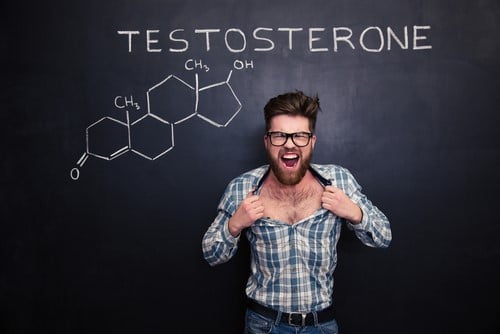What are the Benefits of Testosterone Therapies in Men?
By Dr. Stephen Cosentino
PRESIDENT OF EMPIRE MEDICAL TRAINING
ANTI-AGING | May 1, 2021

What are the Benefits of
Testosterone Therapies
in Men?
Entry made by
Empire Medical Training
Testosterone therapies may have a wide range of benefits for men
Adrenal glands are responsible for the production of the primary hormones cortisol and DHEA. DHEA levels during the day drop around 50% of early levels and cortisol levels drop around 90% by the end of the day. In a healthy individual, DHEA helps to supply
energy, enhances libido, functioning of our thyroid gland, and works to improve muscle tone and immune functions. Cortisol works within the body to adapt to stress and regulating a certain heart and blood pressure in relation
to stress. However, as we age or experience chronic stress both cortisol levels and DHEA output from our adrenal gland may cause an over/underproduction of both.
As part of Empire’s Anti-Aging – Module I & II course study you will be able to identify these symptoms and relationships of these steroid hormones to treat a variety of chronic indications:

Many physicians attending our Anti-Aging Module I & II course of Empire Medical realize it is important to continue learning about various topics discussed at the program such as testosterone
treatment therapies in older men. Therefore, as a service to all prior attendees, we try to expand on certain topics discussed where there may be more information available.
Modern integrated medicine has progressed
to a point where it can be reasonably stated that normalization of serum testosterone in men who are testosterone-deficient is likely to improve symptoms of fatigue, sexual dysfunction, weakness, or reduced muscle mass, and
anecdotal evidence supports testosterone improving mood, sense of well-being, motivation, and osteoporosis. Although testosterone replacement does not work for all individuals it works for the majority of patients and therefore
needs to be seen as a viable treatment option or medication not with the disdain of clinicians who are ignorant to be familiar with the benefits associated with testosterone replacement therapies. Just as menopause affects
all women, andropause is real and affects all men at different ages.
Benefits of Testosterone Therapy

Testosterone therapy may have a wide range of benefits for men, not only in the improvement of sexual symptoms but for a wide variety of metabolic and medical symptoms that promote overall health. The loss of fat and the gain in muscle routinely seen
with testosterone therapy represents a positive change in body composition that has implications for cardiovascular and metabolic health. There are substantial observational and interventional studies that strongly indicate
important links between testosterone and diabetes as well as testosterone and cardiovascular health. The instance of low testosterone levels is associated with 40-55% in active men with diabetes and has been shown to have reduced
insulin resistance.
In addition, there are changing attitudes regarding testosterone therapy and prostate cancer. Originally, it was feared that testosterone therapy might convert occult
prostate cancer into clinical disease, new evidence supports that serum testosterone appears unrelated to prostate cancer risk.

The goal of any treatment is to restore serum testosterone levels to normal (600-800 ng/dL) through lower levels may be adequate for symptom improvement in many men. Treatment options include topical gels, patches, injections, implantable pellets, and a buccal tablet. Gels and patches require daily application, injections are given intramuscular every 1-3 weeks, and pellets may provide adequate serum testosterone concentrations for a range of 3-5 months. Serum testosterone monitoring is mandatory for any of the transdermal modalities since absorption is not uniform and dosage may need to be adjusted to reach therapeutic levels.
It is time that the medical community re-evaluates the health benefits of testosterone therapy. Just the word “testosterone” denotes negative connotations (i.e. athletes, bodybuilders, virility) with many physicians when testosterone can be a solution
for a variety of health problems for which evidence is lacking. Although there is still much to be learned, it is no longer acceptable to suggest that the benefits are uncertain or that these relate only to sexual function.
Testosterone deficiency is a meaningful risk factor for serious medical conditions such as diabetes, atherosclerosis, metabolic syndrome, osteoporosis, and cardiovascular mortality.
For more information on bio-identical hormone therapies and our Anti-Aging – Module I & II course please inquire to (866) 333-6747.


